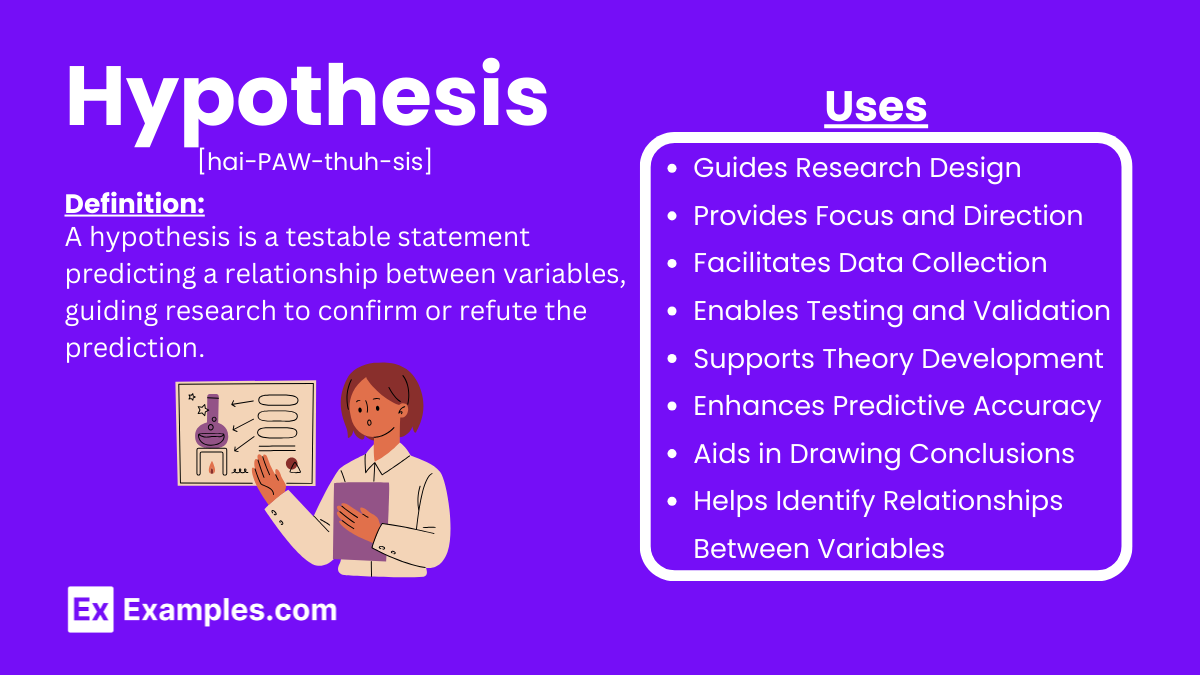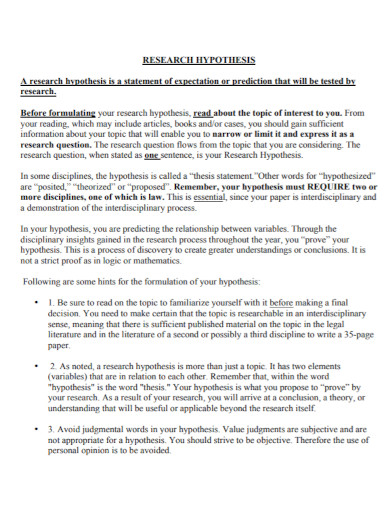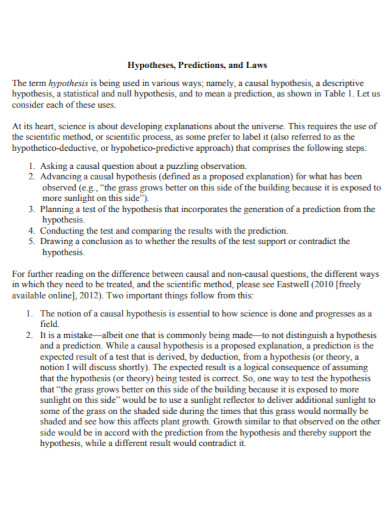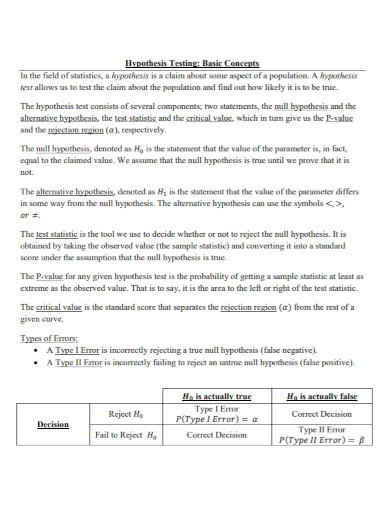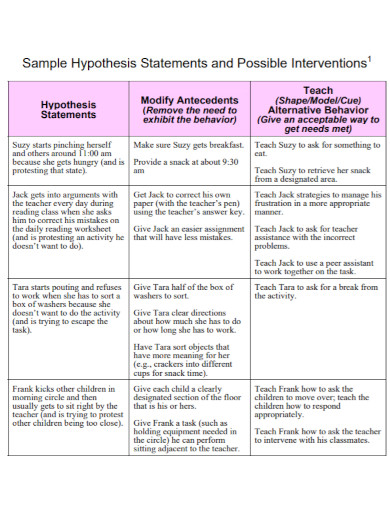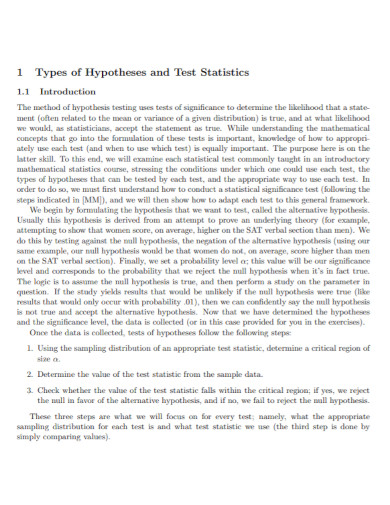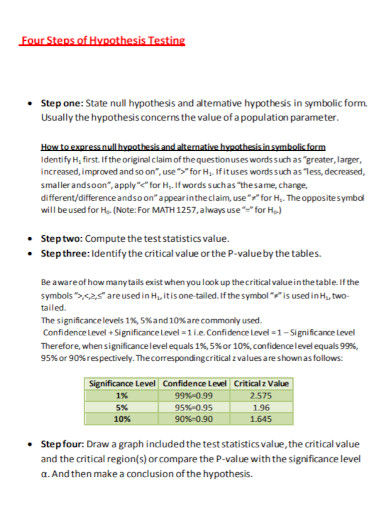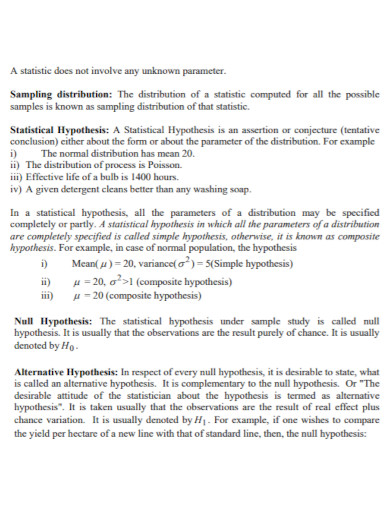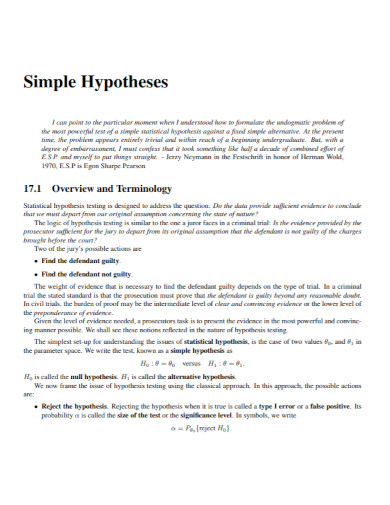Hypothesis
When doing a research action plan students in school would know that the first thing to do is to know your topic well enough. From expecting science projects to work based on your predictions and the results that may have been quite the opposite from how you depicted them. This also rings true in businesses. There is a term for that and it is often associated with the subject Science, but can also be associated with business. Scientific method or a hypothesis.
What Is a Hypothesis?
A hypothesis is a scientific wild guess, a prediction in research. A wild guess, a say from someone without any known proof. A hypothesis can also mean a scientific, educated guess that most scientists and researchers do before planning out or doing experiments to check if their guesses or their scientific ideas based on their topics are exact or correct.
Hypothesis Format
A well-structured hypothesis is crucial for guiding scientific research. Here’s a detailed format for writing a hypothesis, along with examples for each step:
1. Start with a Research Question
Before writing a hypothesis, begin with a clear and concise research question. This question identifies the focus of your study.
Example Research Question: Does the amount of daily exercise affect weight loss?
2. Identify the Variables
Identify the independent and dependent variables in your research question.
- Independent Variable: The variable you manipulate (e.g., amount of daily exercise).
- Dependent Variable: The variable you measure (e.g., weight loss).
3. Formulate the Hypothesis
Use the identified variables to create a testable statement. This statement should clearly express the expected relationship between the variables.
Format:
- If-Then Statement:
- If [independent variable], then [dependent variable].
- Direct Statement:
- [Independent variable] will [effect] [dependent variable].
Directional vs. Non-Directional Hypothesis:
- Directional Hypothesis:
- Specifies the direction of the expected relationship.
- Non-Directional Hypothesis:
- Does not specify the direction of the expected relationship, only that a relationship exists.
4. Example Hypotheses Using the Format
Research Question: Does caffeine affect cognitive performance?
If-Then Statement:
- Example: If individuals consume caffeine, then their cognitive performance will improve.
Direct Statement:
- Example: Caffeine consumption will improve cognitive performance.
Null Hypothesis (H0):
- Example: There is no significant effect of caffeine consumption on cognitive performance.
Alternative Hypothesis (H1):
- Example: There is a significant effect of caffeine consumption on cognitive performance.
Directional Hypothesis:
- Example: Caffeine consumption will improve cognitive performance.
Non-Directional Hypothesis:
- Example: There is a relationship between caffeine consumption and cognitive performance.
5. Refining the Hypothesis
Ensure that your hypothesis is specific, measurable, and testable. Avoid vague terms and focus on a single independent and dependent variable.
Hypothesis Examples in Research
A hypothesis is a statement that predicts the relationship between variables. It serves as a foundation for research by providing a clear focus and direction for experiments and data analysis. Here are examples of hypotheses from various fields of research:
1. Biology
Research Question:
Does sunlight exposure affect plant growth?
Hypotheses:
- Null Hypothesis (H0): There is no significant difference in plant growth between plants exposed to sunlight and those kept in the shade.
- Alternative Hypothesis (H1): Plants exposed to sunlight grow taller than those kept in the shade.
- Directional Hypothesis: Increased sunlight exposure will lead to increased plant growth.
Example:
- If-Then Statement: If plants are exposed to more sunlight, then they will grow taller.
2. Psychology
Research Question:
Does sleep duration affect memory retention?
Hypotheses:
- Null Hypothesis (H0): There is no significant difference in memory retention between individuals who sleep for 8 hours and those who sleep for 4 hours.
- Alternative Hypothesis (H1): Individuals who sleep for 8 hours will have better memory retention than those who sleep for 4 hours.
- Directional Hypothesis: Longer sleep duration will improve memory retention.
Example:
- If-Then Statement: If individuals sleep for 8 hours, then their memory retention will improve compared to those who sleep for 4 hours.
3. Education
Research Question:
Do interactive teaching methods improve student engagement?
Hypotheses:
- Null Hypothesis (H0): There is no significant difference in student engagement between interactive teaching methods and traditional lecture-based methods.
- Alternative Hypothesis (H1): Interactive teaching methods result in higher student engagement compared to traditional lecture-based methods.
- Directional Hypothesis: Interactive teaching methods will increase student engagement.
Example:
- If-Then Statement: If teachers use interactive teaching methods, then student engagement will increase.
4. Medicine
Research Question:
Does a new drug reduce blood pressure more effectively than the standard medication?
Hypotheses:
- Null Hypothesis (H0): There is no significant difference in blood pressure reduction between the new drug and the standard medication.
- Alternative Hypothesis (H1): The new drug reduces blood pressure more effectively than the standard medication.
- Directional Hypothesis: The new drug will reduce blood pressure more than the standard medication.
Example:
- If-Then Statement: If patients take the new drug, then their blood pressure will decrease more than if they take the standard medication.
5. Sociology
Research Question:
Does socioeconomic status affect access to higher education?
Hypotheses:
- Null Hypothesis (H0): There is no significant relationship between socioeconomic status and access to higher education.
- Alternative Hypothesis (H1): Higher socioeconomic status is associated with greater access to higher education.
- Directional Hypothesis: Individuals with higher socioeconomic status will have greater access to higher education.
Example:
- If-Then Statement: If individuals have a higher socioeconomic status, then they will have greater access to higher education.
Hypothesis Examples in Psychology
Psychology research often explores the relationships between various cognitive, behavioral, and emotional variables. Here are some well-structured hypothesis examples in psychology:
1. Sleep Duration and Memory Retention
Research Question:
Does sleep duration affect memory retention?
Hypotheses:
- Null Hypothesis (H0): There is no significant difference in memory retention between individuals who sleep for 8 hours and those who sleep for 4 hours.
- Alternative Hypothesis (H1): Individuals who sleep for 8 hours will have better memory retention than those who sleep for 4 hours.
- Directional Hypothesis: Longer sleep duration will improve memory retention.
- Non-Directional Hypothesis: There is a relationship between sleep duration and memory retention.
Example:
- If-Then Statement: If individuals sleep for 8 hours, then their memory retention will improve compared to those who sleep for 4 hours.
2. Exercise and Anxiety Levels
Research Question:
Does regular exercise reduce anxiety levels?
Hypotheses:
- Null Hypothesis (H0): There is no significant difference in anxiety levels between individuals who exercise regularly and those who do not.
- Alternative Hypothesis (H1): Individuals who exercise regularly will have lower anxiety levels than those who do not.
- Directional Hypothesis: Regular exercise will decrease anxiety levels.
- Non-Directional Hypothesis: There is a relationship between regular exercise and anxiety levels.
Example:
- If-Then Statement: If individuals exercise regularly, then their anxiety levels will decrease.
3. Social Media Usage and Self-Esteem
Research Question:
Does social media usage affect self-esteem in teenagers?
Hypotheses:
- Null Hypothesis (H0): There is no significant relationship between social media usage and self-esteem in teenagers.
- Alternative Hypothesis (H1): High social media usage is associated with lower self-esteem in teenagers.
- Directional Hypothesis: Increased social media usage will decrease self-esteem in teenagers.
- Non-Directional Hypothesis: There is a relationship between social media usage and self-esteem in teenagers.
Example:
- If-Then Statement: If teenagers spend more time on social media, then their self-esteem will decrease.
4. Cognitive Behavioral Therapy (CBT) and Depression
Research Question:
Is Cognitive Behavioral Therapy (CBT) effective in reducing symptoms of depression?
Hypotheses:
- Null Hypothesis (H0): There is no significant difference in depression symptoms between individuals who undergo CBT and those who do not.
- Alternative Hypothesis (H1): Individuals who undergo CBT will experience a greater reduction in depression symptoms than those who do not.
- Directional Hypothesis: CBT will reduce symptoms of depression.
- Non-Directional Hypothesis: There is a relationship between undergoing CBT and reduction in depression symptoms.
Example:
- If-Then Statement: If individuals undergo CBT, then their symptoms of depression will decrease.
5. Parental Involvement and Academic Achievement
Research Question:
Does parental involvement influence academic achievement in children?
Hypotheses:
- Null Hypothesis (H0): There is no significant relationship between parental involvement and academic achievement in children.
- Alternative Hypothesis (H1): Higher levels of parental involvement are associated with higher academic achievement in children.
- Directional Hypothesis: Increased parental involvement will improve academic achievement in children.
- Non-Directional Hypothesis: There is a relationship between parental involvement and academic achievement in children.
Example:
- If-Then Statement: If parents are more involved in their children’s education, then their children will achieve higher academic success.
Hypothesis Examples in Science
Scientific research often involves creating hypotheses to test the relationships between variables. Here are some well-structured hypothesis examples from various fields of science:
1. Biology: Sunlight and Plant Growth
Research Question:
Does sunlight exposure affect plant growth?
Hypotheses:
- Null Hypothesis (H0): There is no significant difference in plant growth between plants exposed to sunlight and those kept in the shade.
- Alternative Hypothesis (H1): Plants exposed to sunlight grow taller than those kept in the shade.
- Directional Hypothesis: Increased sunlight exposure will lead to increased plant growth.
- Non-Directional Hypothesis: There is a relationship between sunlight exposure and plant growth.
Example:
- If-Then Statement: If plants are exposed to more sunlight, then they will grow taller.
2. Chemistry: Temperature and Reaction Rate
Research Question:
Does temperature affect the rate of a chemical reaction?
Hypotheses:
- Null Hypothesis (H0): There is no significant difference in the reaction rate of a chemical reaction at different temperatures.
- Alternative Hypothesis (H1): Increasing the temperature will increase the reaction rate.
- Directional Hypothesis: Higher temperatures will increase the reaction rate.
- Non-Directional Hypothesis: There is a relationship between temperature and the reaction rate.
Example:
- If-Then Statement: If the temperature of a reaction increases, then the reaction rate will increase.
3. Physics: Mass and Free Fall Speed
Research Question:
Does the mass of an object affect its speed when falling?
Hypotheses:
- Null Hypothesis (H0): There is no significant difference in the falling speed of objects with different masses.
- Alternative Hypothesis (H1): Objects with greater mass fall faster than those with lesser mass.
- Directional Hypothesis: Heavier objects will fall faster than lighter objects.
- Non-Directional Hypothesis: There is a relationship between the mass of an object and its falling speed.
Example:
- If-Then Statement: If an object’s mass increases, then its falling speed will increase.
4. Environmental Science: Fertilizers and Water Quality
Research Question:
Do chemical fertilizers affect water quality in nearby lakes?
Hypotheses:
- Null Hypothesis (H0): There is no significant effect of chemical fertilizers on the water quality of nearby lakes.
- Alternative Hypothesis (H1): Chemical fertilizers negatively affect the water quality of nearby lakes.
- Directional Hypothesis: The use of chemical fertilizers will decrease the water quality of nearby lakes.
- Non-Directional Hypothesis: There is a relationship between the use of chemical fertilizers and the water quality of nearby lakes.
Example:
- If-Then Statement: If chemical fertilizers are used, then the water quality in nearby lakes will decrease.
5. Earth Science: Soil Composition and Erosion Rate
Research Question:
Does soil composition affect the rate of erosion?
Hypotheses:
- Null Hypothesis (H0): There is no significant difference in the erosion rate of soils with different compositions.
- Alternative Hypothesis (H1): Soil composition affects the rate of erosion.
- Directional Hypothesis: Soils with higher clay content will erode more slowly than sandy soils.
- Non-Directional Hypothesis: There is a relationship between soil composition and the rate of erosion.
Example:
- If-Then Statement: If soil has a higher clay content, then its erosion rate will be lower compared to sandy soil.
Hypothesis Examples in Biology
In biology, hypotheses are used to explore relationships and effects within biological systems. Here are some well-structured hypothesis examples in various areas of biology:
1. Photosynthesis and Light Intensity
Research Question:
How does light intensity affect the rate of photosynthesis in plants?
Hypotheses:
- Null Hypothesis (H0): Light intensity has no significant effect on the rate of photosynthesis in plants.
- Alternative Hypothesis (H1): Light intensity significantly affects the rate of photosynthesis in plants.
- Directional Hypothesis: Increased light intensity will increase the rate of photosynthesis in plants.
- Non-Directional Hypothesis: There is a relationship between light intensity and the rate of photosynthesis in plants.
Example:
- If-Then Statement: If light intensity increases, then the rate of photosynthesis in plants will increase.
2. Temperature and Enzyme Activity
Research Question:
How does temperature affect the activity of the enzyme amylase?
Hypotheses:
- Null Hypothesis (H0): Temperature has no significant effect on the activity of the enzyme amylase.
- Alternative Hypothesis (H1): Temperature significantly affects the activity of the enzyme amylase.
- Directional Hypothesis: Increasing the temperature will increase the activity of the enzyme amylase up to an optimal point, after which activity will decrease.
- Non-Directional Hypothesis: There is a relationship between temperature and the activity of the enzyme amylase.
Example:
- If-Then Statement: If the temperature increases, then the activity of the enzyme amylase will increase up to an optimal temperature, after which it will decrease.
3. Nutrient Availability and Plant Growth
Research Question:
Does the availability of nutrients in soil affect the growth of plants?
Hypotheses:
- Null Hypothesis (H0): Nutrient availability has no significant effect on the growth of plants.
- Alternative Hypothesis (H1): Nutrient availability significantly affects the growth of plants.
- Directional Hypothesis: Increased nutrient availability will enhance plant growth.
- Non-Directional Hypothesis: There is a relationship between nutrient availability and plant growth.
Example:
- If-Then Statement: If nutrient availability in the soil increases, then the growth of plants will be enhanced.
4. Genetic Variation and Disease Resistance
Research Question:
Does genetic variation in a population affect its resistance to diseases?
Hypotheses:
- Null Hypothesis (H0): Genetic variation has no significant effect on disease resistance in a population.
- Alternative Hypothesis (H1): Genetic variation significantly affects disease resistance in a population.
- Directional Hypothesis: Populations with greater genetic variation will have higher resistance to diseases.
- Non-Directional Hypothesis: There is a relationship between genetic variation and disease resistance in a population.
Example:
- If-Then Statement: If a population has greater genetic variation, then its resistance to diseases will be higher.
5. Water pH and Aquatic Life Health
Research Question:
Does the pH level of water affect the health of aquatic life?
Hypotheses:
- Null Hypothesis (H0): The pH level of water has no significant effect on the health of aquatic life.
- Alternative Hypothesis (H1): The pH level of water significantly affects the health of aquatic life.
- Directional Hypothesis: Extreme pH levels (both high and low) will negatively affect the health of aquatic life.
- Non-Directional Hypothesis: There is a relationship between the pH level of water and the health of aquatic life.
Example:
- If-Then Statement: If the pH level of water is too high or too low, then the health of aquatic life will be negatively affected.
Hypothesis Examples in Sociology
In sociology, hypotheses are used to explore and explain social phenomena, behaviors, and relationships within societies. Here are some well-structured hypothesis examples in various areas of sociology:
1. Education and Social Mobility
Research Question:
Does access to higher education affect social mobility?
Hypotheses:
- Null Hypothesis (H0): Access to higher education has no significant effect on social mobility.
- Alternative Hypothesis (H1): Access to higher education significantly affects social mobility.
- Directional Hypothesis: Increased access to higher education will improve social mobility.
- Non-Directional Hypothesis: There is a relationship between access to higher education and social mobility.
Example:
- If-Then Statement: If individuals have increased access to higher education, then their social mobility will improve.
2. Income Inequality and Crime Rates
Research Question:
Does income inequality influence crime rates in urban areas?
Hypotheses:
- Null Hypothesis (H0): Income inequality has no significant effect on crime rates in urban areas.
- Alternative Hypothesis (H1): Income inequality significantly affects crime rates in urban areas.
- Directional Hypothesis: Higher income inequality will lead to higher crime rates in urban areas.
- Non-Directional Hypothesis: There is a relationship between income inequality and crime rates in urban areas.
Example:
- If-Then Statement: If income inequality increases, then crime rates in urban areas will increase.
3. Social Media Use and Social Interaction
Research Question:
Does the use of social media affect face-to-face social interactions among teenagers?
Hypotheses:
- Null Hypothesis (H0): The use of social media has no significant effect on face-to-face social interactions among teenagers.
- Alternative Hypothesis (H1): The use of social media significantly affects face-to-face social interactions among teenagers.
- Directional Hypothesis: Increased use of social media will decrease face-to-face social interactions among teenagers.
- Non-Directional Hypothesis: There is a relationship between the use of social media and face-to-face social interactions among teenagers.
Example:
- If-Then Statement: If teenagers use social media more frequently, then their face-to-face social interactions will decrease.
4. Gender Roles and Career Choices
Research Question:
Do traditional gender roles influence career choices among young adults?
Hypotheses:
- Null Hypothesis (H0): Traditional gender roles have no significant effect on career choices among young adults.
- Alternative Hypothesis (H1): Traditional gender roles significantly affect career choices among young adults.
- Directional Hypothesis: Adherence to traditional gender roles will limit career choices among young adults.
- Non-Directional Hypothesis: There is a relationship between traditional gender roles and career choices among young adults.
Example:
- If-Then Statement: If young adults adhere to traditional gender roles, then their career choices will be limited.
5. Cultural Diversity and Workplace Productivity
Research Question:
Does cultural diversity in the workplace affect productivity levels?
Hypotheses:
- Null Hypothesis (H0): Cultural diversity in the workplace has no significant effect on productivity levels.
- Alternative Hypothesis (H1): Cultural diversity in the workplace significantly affects productivity levels.
- Directional Hypothesis: Increased cultural diversity will improve productivity levels in the workplace.
- Non-Directional Hypothesis: There is a relationship between cultural diversity in the workplace and productivity levels.
Example:
- If-Then Statement: If the workplace has increased cultural diversity, then productivity levels will improve.
More Hypothesis Samples & Examples in PDF
1. Research Hypothesis
2. Education Hypothesis
3. Basic Hypothesis
4. Hypothesis Statement Template
5. Hypothesis in PDF
6. Hypothesis Format
7. Hypothesis Examples
8. Simple Hypothesis
Types of Hypothesis
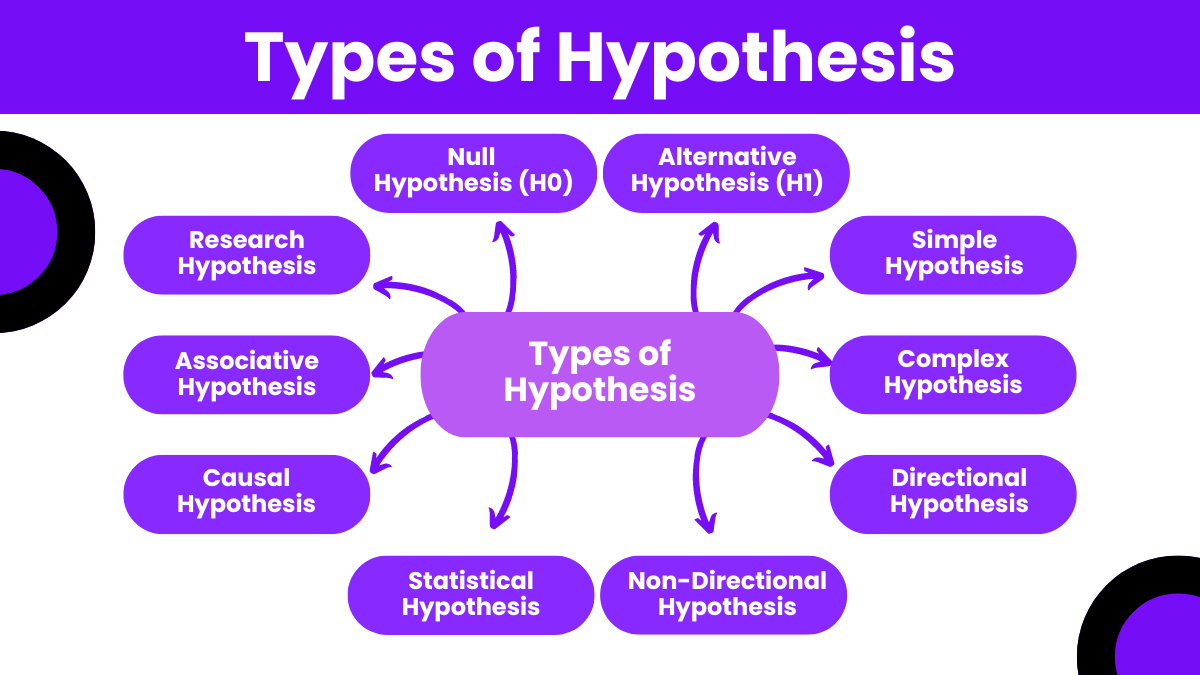
A hypothesis is a statement that can be tested and is often used in scientific research to propose a relationship between two or more variables. Understanding the different types of hypotheses is essential for conducting effective research. Below are the main types of hypotheses:
1. Null Hypothesis (H0)
The null hypothesis states that there is no relationship between the variables being studied. It assumes that any observed effect is due to chance. Researchers often aim to disprove the null hypothesis.
Example: There is no significant difference in test scores between students who study with music and those who study in silence.
2. Alternative Hypothesis (H1 or Ha)
The alternative hypothesis suggests that there is a relationship between the variables being studied. It is what researchers seek to prove.
Example: Students who study with music have higher test scores than those who study in silence.
3. Simple Hypothesis
A simple hypothesis predicts a relationship between a single independent variable and a single dependent variable.
Example: Increasing the amount of sunlight will increase the growth rate of plants.
4. Complex Hypothesis
A complex hypothesis predicts a relationship involving two or more independent variables and/or two or more dependent variables.
Example: Increasing sunlight and water will increase the growth rate and height of plants.
5. Directional Hypothesis
A directional hypothesis specifies the direction of the expected relationship between variables. It suggests whether the relationship is positive or negative.
Example: Students who study for more hours will score higher on exams.
6. Non-Directional Hypothesis
A non-directional hypothesis does not specify the direction of the relationship. It only states that a relationship exists.
Example: There is a difference in test scores between students who study with music and those who study in silence.
7. Statistical Hypothesis
A statistical hypothesis involves quantitative data and can be tested using statistical methods. It often includes both null and alternative hypotheses.
Example: The mean test scores of students who study with music are significantly different from those who study in silence.
8. Causal Hypothesis
A causal hypothesis proposes a cause-and-effect relationship between variables. It suggests that one variable causes a change in another.
Example: Smoking causes lung cancer.
9. Associative Hypothesis
An associative hypothesis suggests that variables are related but does not imply causation.
Example: There is an association between physical activity levels and body weight.
10. Research Hypothesis
A research hypothesis is a broad statement that serves as the foundation for the research study. It is often the same as the alternative hypothesis.
Example: Implementing a new teaching strategy will improve student engagement and performance.
How To Use Hypothesis for Research?
A hypothesis is a critical component of the research process, providing a clear direction for the study and forming the basis for drawing conclusions. Here’s a step-by-step guide on how to use a hypothesis in research:
1. Identify the Research Problem
Before formulating a hypothesis, clearly define the research problem or question. This step involves understanding what you aim to investigate and why it is significant.
Example: You want to study the impact of sleep on academic performance among college students.
2. Review Existing Literature
Conduct a thorough review of existing literature to understand what is already known about the topic. This helps in identifying gaps in knowledge and forming a basis for your hypothesis.
Example: Previous studies suggest a positive correlation between sleep duration and academic performance but lack specific data on college students.
3. Formulate the Hypothesis
Based on the research problem and literature review, formulate a clear and testable hypothesis. Ensure it is specific and relates directly to the variables being studied.
Types of Hypotheses:
- Null Hypothesis (H0): There is no significant relationship between sleep duration and academic performance among college students.
- Alternative Hypothesis (H1): There is a significant relationship between sleep duration and academic performance among college students.
4. Define Variables
Clearly define the independent and dependent variables involved in the hypothesis.
- Independent Variable: Sleep duration
- Dependent Variable: Academic performance (e.g., GPA)
5. Design the Study
Choose an appropriate research design to test the hypothesis. This could be experimental, correlational, or observational, depending on the nature of your research question.
Example: Conduct a correlational study to examine the relationship between sleep duration and GPA among college students.
6. Collect Data
Gather data through surveys, experiments, or secondary data sources. Ensure the data collection methods are reliable and valid to accurately test the hypothesis.
Example: Use a questionnaire to collect data on students’ sleep duration and their GPAs.
7. Analyze the Data
Use appropriate statistical methods to analyze the data. This step involves testing the hypothesis to determine whether to accept or reject the null hypothesis.
Example: Perform a Pearson correlation analysis to examine the relationship between sleep duration and GPA.
8. Interpret the Results
Interpret the results of the statistical analysis. Determine if the data supports the alternative hypothesis or if the null hypothesis cannot be rejected.
Example: If the analysis shows a significant positive correlation, you can reject the null hypothesis and accept the alternative hypothesis that sleep duration is related to academic performance.
9. Draw Conclusions
Draw conclusions based on the results of the hypothesis testing. Discuss the implications of the findings and how they contribute to the existing body of knowledge.
Example: Conclude that longer sleep duration is associated with higher GPA among college students and discuss potential implications for student health and academic policies.
10. Report and Share Findings
Write a detailed report or research paper presenting the hypothesis, methodology, results, and conclusions. Share your findings with the academic community or relevant stakeholders.
Example: Publish the study in a peer-reviewed journal or present it at an academic conference.
How to Write a Hypothesis?
Writing a hypothesis is a crucial step in the scientific method. A well-constructed hypothesis guides your research, helping you design experiments and analyze results. Here’s a step-by-step guide on how to write an effective hypothesis:
1. Understand the Research Question
Start by clearly understanding the research question or problem you want to address. This helps in formulating a focused hypothesis.
Example: How does sunlight exposure affect plant growth?
2. Conduct Preliminary Research
Review existing literature related to your research question. This helps in understanding what is already known and identifying gaps in knowledge.
Example: Studies show that plants generally grow better with more sunlight, but the optimal amount varies.
3. Identify Variables
Determine the independent and dependent variables for your study.
- Independent Variable: The factor you manipulate (e.g., sunlight exposure).
- Dependent Variable: The factor you measure (e.g., plant growth).
4. Formulate a Simple Hypothesis
A simple hypothesis involves one independent and one dependent variable. Clearly state the expected relationship between these variables.
Example: Increasing sunlight exposure will increase plant growth.
5. Choose the Type of Hypothesis
Decide whether your hypothesis will be null or alternative, directional or non-directional.
- Null Hypothesis (H0): There is no relationship between the variables.
- Alternative Hypothesis (H1): There is a relationship between the variables.
- Directional Hypothesis: Specifies the direction of the relationship.
- Non-Directional Hypothesis: Does not specify the direction.
Example of Directional Hypothesis: Plants exposed to more sunlight will grow taller than those exposed to less sunlight.
6. Ensure Testability
Make sure your hypothesis can be tested through experiments or observations. It should be measurable and falsifiable.
Example: Plants will be grown under different levels of sunlight, and their growth will be measured over time.
7. Write the Hypothesis
Write your hypothesis in a clear, concise, and specific manner. It should include the variables and the expected relationship between them.
Example: If plants are exposed to increased sunlight, then they will grow taller compared to plants that receive less sunlight.
8. Refine the Hypothesis
Ensure that your hypothesis is specific and narrow enough to be testable but broad enough to cover the scope of your research.
Example: If tomato plants are exposed to 8 hours of sunlight per day, then they will grow taller and produce more fruit compared to tomato plants exposed to 4 hours of sunlight per day.
How Do You Formulate a Hypothesis?
To formulate a hypothesis, identify the research question, review existing literature, define variables, and create a testable statement predicting the relationship between the variables.
What Is the Difference Between Null and Alternative Hypotheses?
The null hypothesis (H0) states there is no effect or relationship, while the alternative hypothesis (H1) proposes that there is an effect or relationship.
Why Is a Hypothesis Important in Research?
A hypothesis provides a clear focus for the study, guiding the research design, data collection, and analysis, ultimately helping to draw meaningful conclusions.
Can a Hypothesis Be Proven True?
A hypothesis cannot be proven true; it can only be supported or refuted through experimentation and analysis. Even if supported, it remains open to further testing.
What Makes a Good Hypothesis?
A good hypothesis is clear, concise, specific, testable, and based on existing knowledge. It should predict a relationship between variables that can be measured.
How Is a Hypothesis Tested?
A hypothesis is tested through experiments or observations, collecting and analyzing data to determine if the results support or refute the hypothesis.
What Are the Types of Hypotheses?
Types of hypotheses include null, alternative, simple, complex, directional, non-directional, statistical, causal, and associative.
What Is a Directional Hypothesis?
A directional hypothesis specifies the expected direction of the relationship between variables, indicating whether the effect will be positive or negative.
What Is a Non-Directional Hypothesis?
A non-directional hypothesis states that a relationship exists between variables but does not specify the direction of the relationship.
How Do You Refine a Hypothesis?
Refine a hypothesis by ensuring it is specific, measurable, and testable. Remove any vague terms and focus on a single independent and dependent variable.



